- Home
- David Guterson
Problems With People: Stories Page 2
Problems With People: Stories Read online
Page 2
She stopped. The lodge had recently been girded to earthquake standards, but the windows still creaked when the wind blew. He heard that, and when she moved a little, he heard the bedsprings. The noise and the movement of the bed were considerable, so he peeped out from under his forearm. She was trying to get more support from the pillow at her back by pumping it like an accordion. Take mine, he said. I’m not using it.
No. This is fine. I’ll just fluff it up a little.
She got settled again and went back to her story. Where was I? she asked. Probably on a tangent. All I’m really trying to say is that Clifton went out on a limb and talked to me. When we were getting off the bus at school. He was behind me in the aisle, and he said … I don’t know. I could lie and say he said something great, but the truth is, I can’t remember. But he said something. Then we got off the bus and walked together for, seriously, a fraction of a second. After that he said hi all the time. On the bus or elsewhere. Just hi. I said hi back, trying not to flush. I would turn red and sweat, though. This went on for a couple of weeks, during which I thought about Clifton obsessively. I was in love with Clifton Rider. It was really hard for me on the bus. Same thing at school. I couldn’t concentrate. I told my sister I had a crush on Clifton, and she told everybody, and then a rumor came back that Clifton had a crush on me, too.
One day when he said hi to me at school, he caught me in a braver-than-usual mood, and I was able to say, “Hey, Clifton, hold up for a second. I want to ask you something. You’ve been hearing rumors. I’ve been hearing them, too. What have you heard? Rumors are always flying around here.” He beat around the bush on that. He didn’t want to answer straight on, directly. But the upside was, we’d gotten past hi, so now when we passed each other in the halls we would both roll our eyes to indict the lack of privacy at Odessa High School. We were locked in by it. We had something to share. The “This place is just too small” conversation kids have in small towns. You could go on from there. You could take it from there. We were at the friend stage now, but the whole time, I was in love. I wanted Clifton to … just … take me in his arms and kiss me or something. So far we’re not even sitting together on the bus. Remember that? I couldn’t decide if he was nervous or if he just didn’t like me the way I liked him. Two years older was a different category. Maybe he liked me, maybe he didn’t. Remember “Both Sides Now”? Sixty-eight? I just had to hear that song and—bang—even though it had nothing to do with me or Clifton. But that’s music for you.
Ditto.
“Both Sides Now”?
It’s possible to go there if your mood’s right.
Her assenting murmur was not entirely firm, and made him think that covering his face while he spoke had gotten rude. He uncovered it and sat up. Did with his pillow what she’d done with hers. I like his name, he said. Clifton Rider.
Clifton, she answered. I thought it was great. And his last name, too. Super-cowboy!
You had a cowboy thing.
No. But I had a Clifton thing, so that smoothed the way for a cowboy thing—singular. Clifton was sort of cowboy in a neatnik way.
He rode a horse?
Actually, a dirt bike. Or a farm bike. They had a thing in Odessa called Deutschesfest, and it included a motorcycle run. People screamed out of town and came back a couple hours later covered with dust. I don’t know what it was all about. That’s just what we did then. I was down there with my friends, probably just hanging around, doing nothing, laughing at the polka music outside the beer garden, and Clifton rolls up on his bike and says, Hey! Hop on! I didn’t think. I just saddled up, figuring my friends would sort of chalk it up to the Deutschesfest spirit. A farm bike, that was how you got around—kids took these farm bikes into the Scablands. All the epic teen-ager stories were about bikes in the Scablands. People went for parties. There were places we knew about. You could get down over the base of a bench and be out of the wind where a lot of old fencing had been dumped and build a bonfire, and drink whatever. We used to pool our money and send someone to this place in Spokane, a little store that didn’t card. But me and Clifton—we didn’t do it, but we came close. Oh boy, Clifton! By a fencepost fire. Then we went back, because we had to. People would miss us. They’d all be talking. It was a huge concern. What if people knew? So we went back to Deutschesfest, and he let me off. I found my friends and said, “Yeah, great ride, we went out toward Duck Lake or something.” I found my parents in the food tent and did, you know, sausage and strudel, but it was one of those “Aren’t you hungry, somethin’ wrong?” kind of dinners, because I was on Cloud Nine. Blissed out. Couldn’t eat. Because of Clifton.
How do I explain this? I lost my virginity. But it was really tough for me and Clifton to get together, because my parents were not going to go for this guy. I had to hide him. Not that they paid attention. They thought exclusively about wheat, is what I thought then. They weren’t human to me. Wheat on the brain. The farming game. But I told my sister, and she was good about things. We were close—still close. She lives in Denver. You know what? You always have to have an accomplice. When she fed the dogs at night, she muzzled them for me. That way, after my parents went to bed I could climb out the window and not set off barking. And get with Clifton. He’d be waiting by the shed with condoms in his pocket. He brought blankets, and he’d be standing there with the blankets, and, you know, we’d go into the shed. We’d go into a corner of the shed and wrap up in blankets. For hours. Sometimes until it was almost morning. Then Clifton would creep off into this little ravine where he’d stashed his bike out of earshot. I pulled the dog muzzles before I climbed back in. You have to wonder how many kids are doing this. Sneaking around. A lot, but only a few of them are having a great time, if they’re honest, and those are the ones who are madly in love.
Maybe you’ve been there. Have you been there, Odessa? It’s like Spokane. You look at the weather report for Spokane, it’s at least low twenties just about every night after Thanksgiving. Inside the shed, maybe it’s thirty-two. With the blankets and us, better than that. We whispered all the time, because we were scared. Whispered conversation. The natural subject when someone’s eighteen is, What are you going to do with your life? Clifton didn’t know. If he didn’t get drafted, he was hoping to work on farm equipment. Or for a seed company. But he didn’t want to farm, and he didn’t want to leave the county. He didn’t want to leave because of me, he said. If he left he couldn’t see me, and that would kill him. Me! Year before, I’m no one to anyone; then I turn sixteen, go through physical changes, and now Clifton Rider can’t live without me. I’m aware of that. But, still, it’s genuine. Puppy love is real to the puppies—completely real. Hey—I went to Spokane with my parents and my sister every year to go Christmas shopping, and that year, I bought Clifton an album by The Doors. It was snowing, and there were cars off the road near the air-force base—Fairchild Air Force Base. I say this because it was a bad snow year. It piled up. Hard to say how much. Three feet, maybe? Never got warm enough to melt, either. Just kept adding, usually at night. A lot of mornings, we had fresh snow on the ground. When was this pattern going to stop? That kind of weather, notable weather—they had the roads plowed and sanded, but they couldn’t keep up. People liked talking about the wipe-outs and near misses. Small town, no real news. The lights went on at our house—my mom liked Christmas lights. Snow’s downtime for wheat farmers. My dad played with lights.
I’ve been guilty of that. When the kids were young. To make them happy.
And did Christmas lights make them happy?
I feel bad for my kids. That’s the—Sorry.
We’re here, she answered. The door’s shut. We’re here, and that’s what we came for.
They took in their room. It was spartan at best. The money went to the lobby, not the rooms, and, in accordance with the mountain, there was a dearth of appointments. But she was right: they were here, whatever the appointments, and, anyway, he didn’t care about appointments. So it was all right—maybe—to menti
on his kids. Clifton, he said. Clifton Rider.
The weather I described was bad for me and Clifton. Icy roads didn’t exactly lend themselves to shed trysts. Too hard for Clifton to get around on his bike. Footsie under the table in the school lunchroom became it. My parents got wind—small town, of course—and my dad down-talked the Riders incessantly. He said he didn’t know anything about them except that they were Holy Rollers and hunted without permission, out of season. Tongue speakers. Foot washers. Who’d they sell grain to? Who’d they buy fuel from? Where’d they get fertilizer? They didn’t use the people my dad used, so they must be terrible human beings. My mom didn’t cotton to the Riders, either. I was too young to have a boyfriend. I needed to be thinking about other things. Well: I put the emphasis on friend whenever Clifton came up. But my sister knew everything.
So. I told Clifton I had a Christmas present wrapped up for him and ready to go. But snow kept falling all through December. Clifton wrote me love notes. Clifton, with his dirty, greasy farm bike—Clifton wrote love notes. How he thought about me constantly. Sweet little amorous folded-up notes. I’m not saying Clifton was a poet, but his notes were good. You wouldn’t think that was the case. Thick-necked farm boy. I really liked this about him—underneath, the note writer. Just me, no one else ever saw the real Clifton. Actually, I didn’t get to see him much, either, because of the snow that December. Our notes were about, how could we get together? Then—winter vacation, or Christmas vacation, so now I’m not even seeing him at school. It’s literally physically painful not to see someone when you’re that much in love. Finally, not Christmas Eve but the day before Christmas Eve, Clifton tells his parents he’s going duck hunting. He borrows his dad’s fake ducks—decoys, they’re called—and stuffs them in sacks and ties them to his farm bike. Gets out the gun, goes through all the motions. Gets out the waders, the duck call, the Elmer Fudd cap—all the duck-hunting accoutrement clichés. All so he can rev up at three a.m. without his parents’ wondering why.
Guy got to me in a snowstorm. Came in through the back field so the dogs wouldn’t get wind of him. I woke up because snowballs were hitting my window. There’s Clifton in the Elmer Fudd cap. I opened up and told him to be quiet—you know, a finger to my mouth, shush. It’s snowing, but the moon is out. Clifton is brushing snow off his shoulders. Stuff is falling hard, which is good, because it’ll cover his tracks—maybe he hadn’t thought of that. Maybe he wasn’t as smart as I thought he was. Or maybe he was. I don’t know. But, anyway, I sent him to the shed. I pointed at the shed, he went, I got dressed—two sweaters, best shoes I had in the room—but then, with the snow, it didn’t seem like I could get out the window. Too slippery. Too dangerous. I tried, but it couldn’t be done. I was going to have to tiptoe down the stairs, which meant getting past my parents’ bedroom without waking them up. Impossible. My mom was a light sleeper, lifelong insomniac. I didn’t know what to do. What could I do? I looked for Clifton, but Clifton was in the shed. I was stuck—snowbound, as they say, on the one hand, parent-bound on the other. No getting out. No answer. I kept looking out the window. I thought that, after a while, Clifton would come see what was up and I could explain it to him, my predicament. But he didn’t. So I just went on wondering what to do. Finally, I went down the hall and said, “I can’t sleep. There’s a lot of new snow. I’m gonna go outside for a few minutes.” That seemed innocent enough. And it got me past them with the Doors album and out the door, and then I ran to the shed. But no Clifton. No Clifton in the shed. I’d say it was probably about five degrees outside, and fifteen in the shed. Clifton’d left me a note, and while I don’t have it memorized word for word, it was basically to the effect of, “What happened? I waited. I love you. I miss you. I need you. Let’s get married so we can stop sneaking around like this.” And he’d left me a little Christmas present, nicely wrapped, which I put in my coat pocket and didn’t open right away, because I had other things to think about, other things to be nervous about. I went out, and I could see his boot prints going off across the back field. Filling in fast. It’s still dark, but now I’m thinking when my dad gets up he’s going to see those prints and know. So I walk out a ways, until that’s taken care of, his prints are blurred by mine, and a few times, when I’m far enough from the house, I call for Clifton. Real loud, but lost in the snow. Then I have to turn back. I’m frozen to the bone. I can phone him later and explain what happened. Give me the benefit of the doubt and let me be a little romantic here—it was very poetic. Sixteen, out there in the snow, in love, pining, and calling Clifton’s name one more time before turning back. I can still hear my voice not traveling.
Go ahead. I don’t begrudge you the right to … Just go ahead.
That’s because of your own life, she said. That’s what I saw the first time we met. At that wine bar.
She touched his temple. Stroked his hair—what was left of his hair. You know what? she said. I look right through you and see the boy inside. Boy Clifton’s age. I mean, I can look right through you now and see you.
I do that. But come on—what happened?
Terrible, she said. I hate small towns. Anyway, the phone. You know, the dreaded phone call. My dad took it—“Bad news,” he told me. “Sit down for this. That ‘friend’ of yours, Clifton Rider? They found him this morning. On Mohler Road. Skid-out accident, broke his leg, froze. Poor kid. I hope you’re gonna be okay. You okay? That’s a hard thing to get over when a teen dies. I—”
Clifton died?
Died.
And he wanted to marry you.
He said that, anyway. His gift was a ring. A band from Spokane. An engagement ring.
She paused on that, and so did he, because he didn’t know what to say in the face of it. After all, she’d more than implied that she believed in love as something greater than adolescent hormones. Although, again, maybe that was wrong. Maybe her point was: kids are so dumb that at sixteen she would have married Clifton Rider, which would have meant passing her life in Odessa, or near Odessa, coughing up loess, watching the price of wheat, eating Deutschesfest strudel, and making sure her kids never sneaked around behind her back having premarital sex. Hmmm, he said. So which Doors album did you get him?
Waiting for the Sun.
She went silent again, and then reached for her toes—he had the feeling so as to hide her face from him.
Hey, he said.
But still she spoke with her head down: The big song was “Hello, I Love You,” but I don’t know. Not so great. The one I listened to after Clifton died was “Not to Touch the Earth.” Jesus, that song! He loved that song. Clifton liked Jim Morrison, the Dionysian poet.
She still wouldn’t look at him. Why was that? Once more that silver hair of hers spiraled down like a Möbius strip. Okay, he said. Let me get my phone. Let me see if I can get it on my phone. He got up, found his phone, dropped, dragged, and brought up The Doors, “Not to Touch the Earth.” Are you ready? he asked. I’ve got it here.
No.
You don’t want to hear it?
Okay. Go.
Somewhat banal—“Not to touch the earth, Not to see the sun, Nothing left to do, but Run, run, run”—and, when not banal, cryptic in the ecstatic Morrison vein. But did it matter? Because now the new woman in his life was crying. She was crying hard enough to make him see approximately where he stood in her life. A trip to Paradise with a guy met on match.com. It had come to that. They were doing their best. He touched her fingers and she took his hand. Who was this person he was about to make love with? Or was that the right term—making love?
Tenant
He was sitting down to dinner when the finder called. If you wanted to call it dinner. Two scrambled eggs and toast with peanut butter, which he planned to eat in front of the television. He’d plated his food and poured his beer, he was just now pulling the ottoman close and trying to recall where he’d left the remote—there it was between the picks for his gums a dental hygienist had given him that morning and some Sunday-paper advert
ising circulars; probably he’d have to slap it a little because the batteries inside were loose. Should he answer or let his machine take the call? The eggs were warm, the beer was cold. He was ready to eat; he didn’t need a hassle. Answering the phone would mean a physical effort. He walked the six steps, though, to the caller-ID box, and when it registered with him that the caller was his finder, he put down the beer and picked up. “Yes,” he said.
This finder—he hardly knew him—liked pleasantries before business. This finder was from the school of socially correct throat-clearing and so, in a tone of droll commiseration, described the current weather—miserable, rainy—and the terrible traffic on Interstate 90 from Mercer Island to the 405 interchange. According to him there were two good options—well-qualified people who checked out on every front—as a result of his professional efforts. He’d shown the apartment three times that afternoon, first to a woman who admired the remodel—the great-room space, the light, the cork floors—but who didn’t want to move from her apartment down the corridor: “A voyeur,” said the finder. “Someone just looking.” Then to a nurse who wanted eagerly to rent it—a woman who “would make a perfectly good renter.” Then to a woman who was the broker’s top pick because of her references and “an off-the-charts credit score somewhere in the low-mid-eight-hundreds.”
“Go with your top pick,” he told the finder.
The finder arranged matters. The renter, whose name was Williams, Lydia Williams, signed the Lease/Rental Agreement and initialed each page. Her signature was indecipherable—as it was on her check for the first and the last months’ rent and a prorated eleven days, and on her check for the damage deposit—but her initials were, by contrast, stark and plain. Lydia Williams, renter, he thought, of a modest two-bedroom apartment with a garage. Lydia Williams, cryptic nonpresence, intangible so far because he hadn’t seen her, but generator—he hoped faithfully and smoothly—of perpetual rental income. He put a copy of their agreement in his “Apartment” file, along with her application and credit report, but not before confirming that it accurately portrayed their payment arrangement, namely, that Lydia Williams’ rent would henceforth flow from her bank account to his via electronic transfer on the fifteenth of each month; the fifteenth for tax purposes—he liked it for its symmetry. He also filed a letter from the finder, who therein reported providing Williams with two sets of keys to the front door, garage, mailbox, and garbage/recycling enclosure, and explaining parking regulations to her, and parceling out to her the right decal for her windshield and the right pass for her guests, and stressing to her the rules in force at the Blue Vista Condominium Complex, and leading her on a “walk-through” so she could list flaws she wouldn’t be responsible for at move-out. But she’d listed nothing, either because she didn’t want to or hadn’t looked closely, or maybe because he’d worked so diligently to render the apartment rentable, to put it in good order. He’d painted the inside of the front door, patched the drywall. There were new batteries in the smoke detectors.

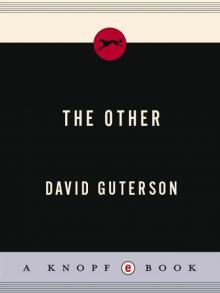 The Other
The Other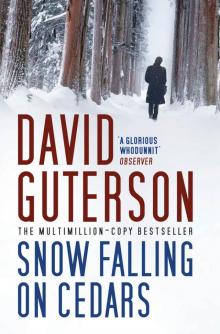 Snow Falling on Cedars
Snow Falling on Cedars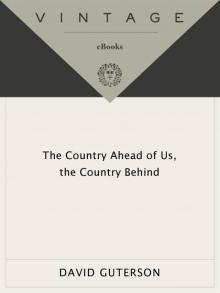 The Country Ahead of Us, the Country Behind
The Country Ahead of Us, the Country Behind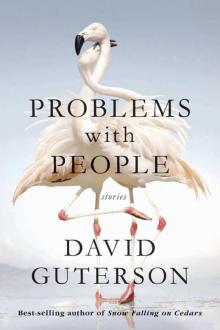 Problems With People: Stories
Problems With People: Stories East of the Mountains
East of the Mountains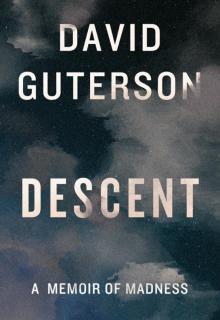 Descent: A Memoir of Madness
Descent: A Memoir of Madness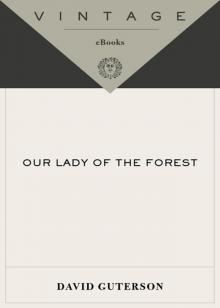 Our Lady of the Forest
Our Lady of the Forest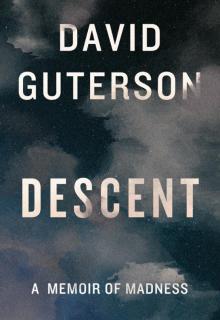 Descent
Descent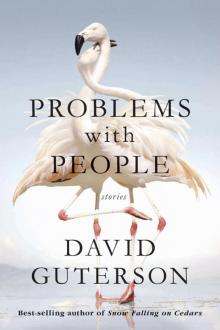 Problems with People
Problems with People